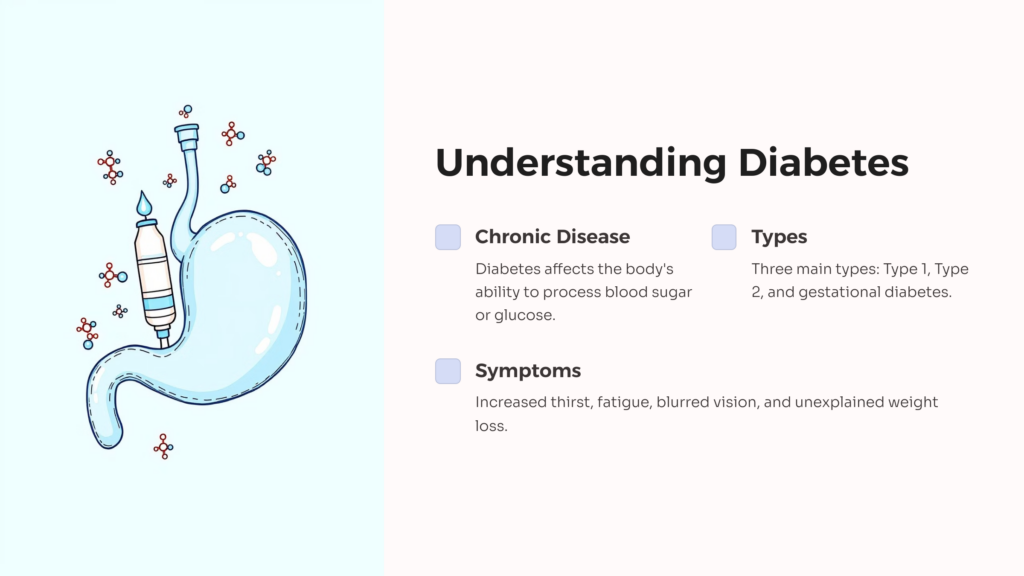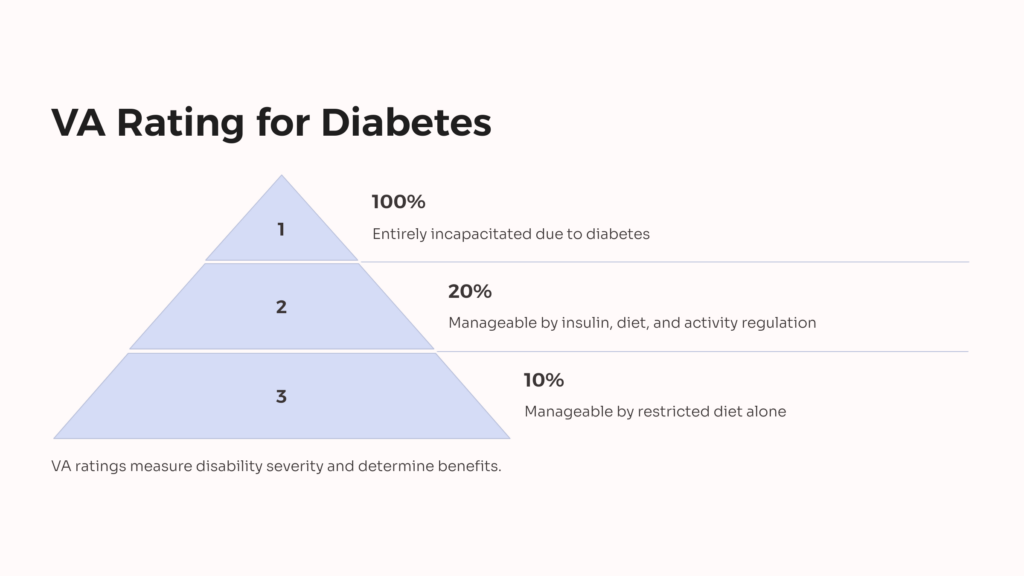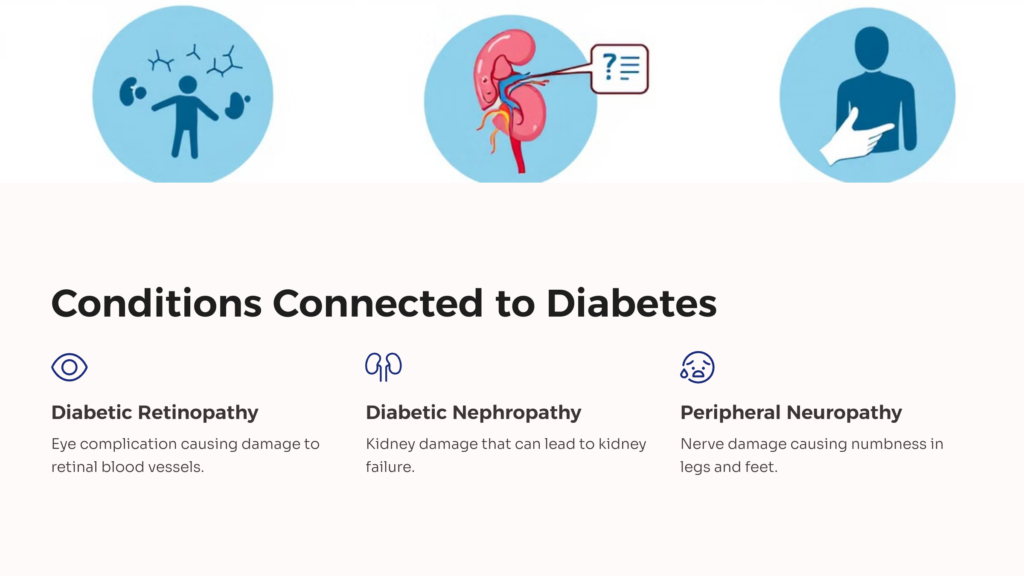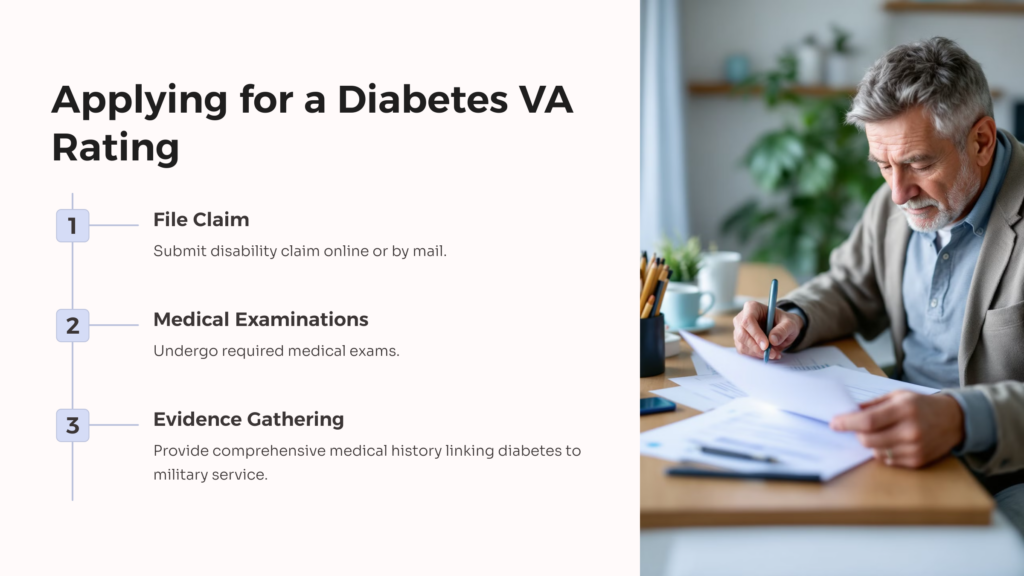Introduction
Diabetes, a prevalent condition worldwide, has significant implications, especially for veterans. The term diabetes is often misunderstood. It encompasses several conditions that affect how your body processes blood sugar or glucose. Establishing a clear understanding of diabetes is vital as its effect can influence a veteran’s benefits through the Veterans Benefits Administration’s Rating System. This article aims to shed light on how diabetes affects veterans, the importance of the VA rating, its link to diabetes, and how to maximize the benefits available to you.
Understanding Diabetes

What is Diabetes?
Diabetes is a chronic disease characterized by the body’s inability to produce enough insulin or effectively use the insulin it produces. Insulin, a hormone produced by the pancreas, helps regulate blood sugar levels. A lack or ineffective use of insulin leads to elevated glucose levels in the blood, a condition known as hyperglycemia.
Different Types of Diabetes and Their Symptoms
There are three main types of diabetes: Type 1 diabetes, Type 2 diabetes, and gestational diabetes. Type 1 diabetes, also known as juvenile diabetes, sees the body’s immune system destroying the cells responsible for producing insulin in the pancreas. Type 2 diabetes, the most prevalent type, arises when the body’s cells become resistant to the effects of insulin. Lastly, gestational diabetes occurs only during pregnancy. Each type presents varying symptoms, including increased thirst, fatigue, blurred vision, slow-healing sores, and unexplained weight loss.
Diabetes Effect on Individuals, Especially War Veterans
Diabetes can adversely affect an individual’s day-to-day activities and overall quality of life due to its wide array of complications, such as stroke, kidney disease, and heart disease. War veterans are not exempt from such adversities, with some cases exacerbated by the challenges they encountered in the line of duty.
VA Rating for Diabetes

Definition and Explanation of VA Rating
The VA rating system is a tool deployed by the Veterans Benefits Administration to measure the severity of a disability and how it decreases a veteran’s health and functionality. Each disability receives a rating expressed as a percentage, which determines the VA benefits a veteran will receive for their disability or disabilities.
How Diabetes Might Affect a VA Rating
Considering that diabetes is a chronic and lifelong condition, its influence on a veteran’s VA disability rating can be substantial. Veterans diagnosed with diabetes can secure disability benefits, allowing them to receive monthly compensation to help cater to their medical expenses and ensure a better quality of life.
VA Rating Percentages for Diabetes and What They Mean
The VA rating for diabetes ranges from 10% to 100%. A 10% rating is given when a veteran’s diabetes is manageable by a restricted diet alone. A 20% rating means that their diabetes is manageable by insulin, restricted diet, and regulation of activities. Greater percentages indicate the increasing severity of the condition, ultimately resulting in a 100% rating, which means the veteran is entirely incapacitated due to diabetes.
Conditions Connected to Diabetes

Diabetes often doesn’t exist in isolation. Numerous conditions are inextricably linked with diabetes. Having a secondary condition can significantly influence a veteran’s disability rating.
Diabetic Retinopathy
This condition is an eye complication that arises due to diabetes, where the blood vessels in the retina are damaged. Diabetic retinopathy can lead to vision loss and is often considered in establishing a veteran’s compensation.
Diabetic Nephropathy
This condition, another serious complication of diabetes, is characterized by kidney damage over time, which can eventually lead to kidney failure. It can significantly augment a veteran’s VA rating, considering its detrimental implications on overall health.
Diabetes-Related Peripheral Neuropathy
This neuropathic condition frequently occurs in diabetic patients, resulting in nerve damage that leads to loss of feeling or numbness, especially in the legs and feet.
How to Apply for a Diabetes VA Rating

Acquiring a VA disability rating for diabetes does not have to be an insurmountable hurdle. It involves a somewhat straightforward process.
Process of Applying
The process starts with filing a disability claim with the Veterans Benefits Administration. This can either be done online or by mail. The next stages include medical examinations and gathering of evidence, through which the VA determines whether your diabetes is service-connected or was worsened due to your military service.
Required Documentation and Medical History
For a successful claim, veterans need crucial documentation, including a comprehensive medical history that unequivocally links their diabetes to their military service. The medical records should demonstrate that your diabetes was diagnosed within one year after separation from service.
Best Time to Apply for the Rating
The optimal time to apply for a VA rating for diabetes is immediately after you’ve been diagnosed. This timely action ensures the VA’s recognition of the service connection and makes the process easier.
Factors that Affect the Diabetes VA Rating
Numerous factors can sway the VA’s decision on a diabetes claim.
How Condition Severity Influences the Rating
The severity of diabetes plays the most significant role in determining the VA rating. A veteran struggling with severe diabetes symptoms, for example, would see this reflected in a higher VA rating compared to a veteran with milder symptoms.
The Role of Diabetes Management in the VA Rating
How well diabetes is managed can also affect the VA rating. For example, if a veteran’s diabetes is well-controlled through diet and oral medication, the VA rating might be lower.
Affecting Factors of Corresponding Disabilities
Furthermore, the presence of other disabilities related to diabetes will weigh heavily on the VA rating. For example, a veteran with diabetes who also has developed diabetic retinopathy or neuropathy might see a higher VA rating than another with diabetes only.
Tips for Maximizing Your VA Rating for Diabetes
Manage Your Diabetes Effectively
Most importantly, strive to manage your diabetes effectively. Regular physical activity, balanced nutrition, and medication compliance can alleviate the effects of your condition.
Prepare a Well-Documented Case for the VA
When applying for a VA rating for diabetes, ensure you have all the necessary documentation in place. This includes medical records, service-connection evidence, and doctors’ statements.
Regular Medical Check-ups
Regular medical check-ups are crucial. They not only ensure your diabetes is effectively managed but also provide up-to-date records for your VA rating claim.
Conclusion
Understanding the ins and outs of how the VA rating system and diabetes interplay can seem daunting but is important for every veteran dealing with diabetes to know. With appropriate management, you can enjoy a high-quality life despite your diagnosis. Keep in mind that the VA rating system is there to ensure you are compensated based on your condition’s severity and its effect on your health and functionality. Therefore, proper management of diabetes, thorough documentation, and regular medical check-ups can largely affect your VA rating positively. Above all, remember that despite the hurdles that may come your way, you are not alone, and there are resources to help you in your journey.
 AllVeteran.com Advisors
AllVeteran.com Advisors
With expertise spanning local, state, and federal benefit programs, our team is dedicated to guiding individuals towards the perfect program tailored to their unique circumstances.











